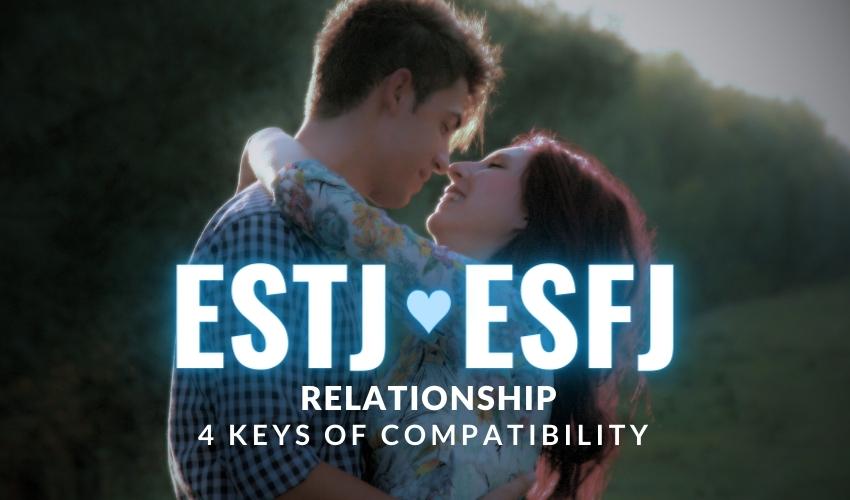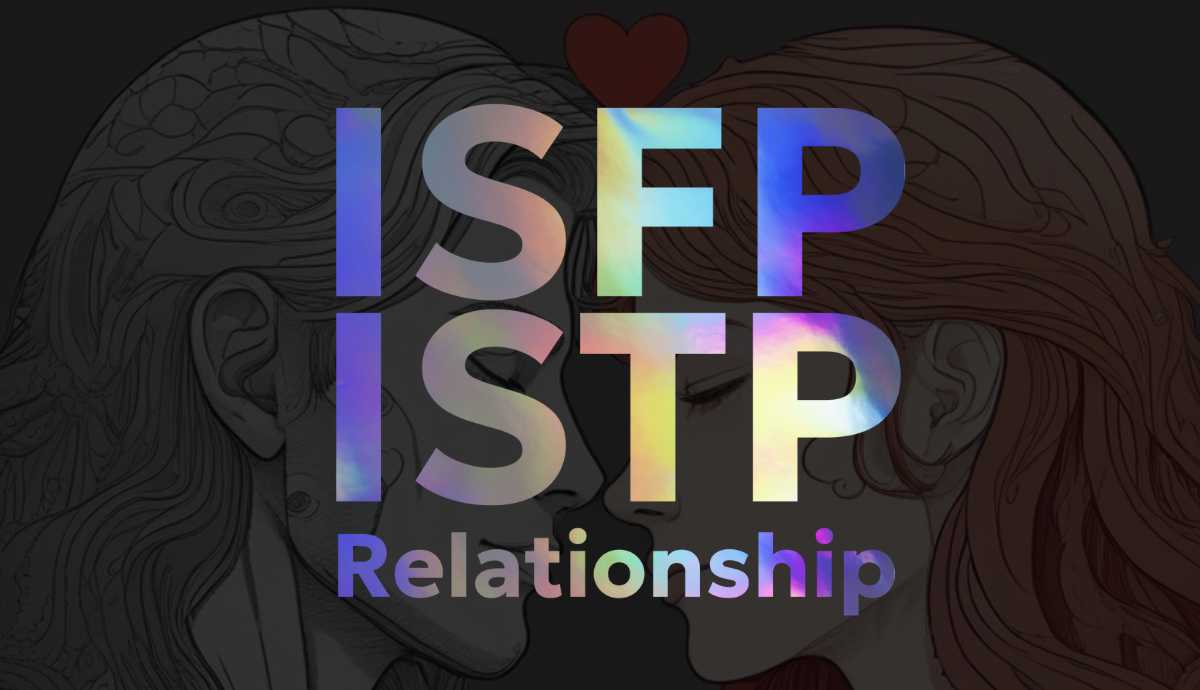The ESTJ and ESFJ are two of the 16 MBTI personality types. The ESTJ cognitive functions are Te, Si, Ne and Fi in contrast to the ESFJ functions Fe, Si, Ne and Ti. While they differ in judging preference (thinking vs feeling), these types share common ground in their Si (introverted sensing) perceiving preference. Moreover, on account of their shared SJ preference, they are classified as part of the guardian temperament group along with the ISTJ and ISFJ. As extraverted types, ESTJ and ESFJ also draw most of their energy from external activity whether social or technical.
| ESTJ | ESFJ | |
|---|---|---|
| dominant | Extraverted Thinking (Te) | Extraverted Feeling (Fe) |
| auxiliary | Introverted Sensing (Si) | Introverted Sensing (Si) |
| tertiary | Extraverted Intuition (Ne) | Extraverted Intuition (Ne) |
| inferior | Introverted Feeling (Fi) | Introverted Thinking (Ti) |
Naturally, types who share such similarity are more likely to get along and understand one another well. In a relationship, these two have favorable romantic prospects underscored by a general agreement in fundamental values. A survey from thoughtcatalog.com showed that most ESTJ and ESFJ participants rated “Quality time” and “Words of affirmation” as their top love languages. This is further evidence that these two are on the same page when it comes to romance and affection.
However, as with any romantic pairing of personality types, there will be potential advantages and also challenges. Here, we will explore 4 key aspects of this relationship and how ESTJ and ESFJ can navigate their differences to create a loving, fulfilling partnership.
1. Bonding Over Shared Experiences.
Both ESTJ and ESFJ tend to be pragmatic and somewhat risk-averse. They prefer stability over uncertainty, which often leads to meticulous planning and routine. However, this can sometimes result in boredom or stagnation in their relationship. The lack of spontaneity can make their relationship predictable, which, over time, could become monotonous.
This shared focus on the day to day tangible elements of life can create a strong bond between them, enabling them to understand and relate to each other on a deep level but it can sometimes lead to them being a bit short-sighted. To counteract this tendency, it’s important for these types to ensure that they have some mutual long-term goals to guide the relationship towards improvement and progress. These goals can serve as a shared vision that can keep them aligned and motivated.
2. Conflicts in approach
While there is a lot of common ground between ESTJ and ESFJ, their approach to situations can sometimes be a source of friction. The ESFJ personality type, being more feeling-oriented, tends to focus more on preserving harmony and relationships. On the other hand, the ESTJ, with their thinking disposition, is more focused on achieving objective outcomes. Their differing priorities in approach combined with their desire for resolution may lead to each type viewing the other as stubborn, nitpicky, or irrational. It’s not uncommon for either type to be obstinate about wanting things to be arranged or done a particular way.
Both types tend to be detail-oriented and methodical when performing tasks, however, they might set different personal priorities based on lessons learned from prior experience. And so despite their many commonalities, the ESTJ and ESFJ can sometimes clash over issues of control and nuances about how things should be done. Both personality types have a strong desire for order and organization, which can lead to disagreements if their ideas of orderliness differ. However, with open communication and mutual respect, they can navigate these issues effectively.
3. Shared focus on stability and tradition.
Another key aspect of the ESFJ and ESTJ relationship is their mutual focus on stability, family, civic responsibility, and maintaining a good reputation within the community. Both personality types have high regard for tradition and legacy, which can form a strong foundation for their relationship. This shared value system can bring them closer and create a strong bond between them.
As a partnership, these two can compliment each other well with their respective strengths. Because they value structure and a good working order, both types will have little problem committing to specific duties allotted to one another. ESTJs can take the lead in managing the impersonal responsibilities of budgeting, fixing problems, and the technical details of planning and scheduling.
ESFJs for their part, may tend to the management of domestic affairs, family care and community. ESFJs bring warmth, sensitivity, and a people-first focus to the roles and responsibilities they perform. Together, ESFJ and ESTJ can be a perfect team when on the same page and working together toward a common goal.
4. Potential Misunderstandings/ Navigating Disagreements Respectfully.
Due to their distinct personalities, the ESTJ and ESFJ might sometimes misunderstand each other. The ESFJ might perceive the ESTJ as overly critical or insensitive, given their focus on logic and objectivity. Conversely, the ESTJ might see the ESFJ as overly emotional or indecisive because of their empathy-centric approach. Recognizing these potential misunderstandings and communicating openly can help in overcoming these hurdles.
Disagreements are inevitable in any relationship, including those between ESTJ and ESFJ. However, the key is how these disagreements are handled. It’s important to avoid hurling criticism, blame, or accusations at each other. This can be particularly damaging to the relationship as both ESTJ and ESFJ take their commitments seriously and can be deeply hurt by such actions.
Instead, both types should try to approach disagreements in a way that maintains focus on establishing consensus or compromise. So, when ESTJs need to offer help or point out issues, they should do so in a way that is sensitive and tactful to maintain a harmonious relationship. This not only respects individual differences in opinion but also strengthens the bond between the two.
Pros and Cons of the ESTJ and ESFJ Relationship:
Pros:
- Shared Values: Both ESTJs and ESFJs tend to value tradition, loyalty, and stability, creating a strong foundation for their relationship.
- Commitment: Both types are typically committed and responsible individuals, dedicated to their partners and their relationship.
- Social Harmony: ESFJs’ warmth and empathy complement ESTJs’ practicality, creating a supportive and harmonious atmosphere in the relationship.
- Organizational Skills: ESTJs’ organizational skills can complement ESFJs’ nurturing nature, leading to a well-managed household and family life.
- Shared Activities: Both types enjoy socializing and may find common interests in activities like hosting gatherings, volunteering, or participating in community events.
- Clear Communication: ESTJs’ direct communication style can complement ESFJs’ desire for open and honest communication, leading to effective problem-solving and conflict resolution.
- Mutual Support: ESTJs and ESFJs are likely to support each other’s goals and ambitions, providing encouragement and practical assistance as needed.
Cons:
- Rigidity: Both types may have a tendency towards rigidity and inflexibility, leading to disagreements over minor details or differing opinions.
- Conflict Handling: ESTJs may prefer a more direct and confrontational approach to conflict resolution, while ESFJs may avoid conflict to maintain harmony, leading to unresolved issues.
- Emotional Expression: ESFJs may desire more emotional expression and validation than ESTJs naturally provide, leading to misunderstandings or feelings of neglect.
- Different Priorities: ESTJs may prioritize efficiency and productivity, while ESFJs may prioritize relationships and social harmony, leading to conflicts over time management and priorities.
- Need for Recognition: ESFJs may desire more recognition and appreciation for their efforts in the relationship, which ESTJs may overlook or take for granted.
- Independence vs. Dependence: ESTJs may value independence and self-sufficiency, while ESFJs may prefer interdependence and closeness, leading to conflicts over autonomy and boundaries.
- Decision-making Styles: ESTJs may prefer making decisions based on logic and practicality, while ESFJs may consider emotional and interpersonal factors, leading to differences in decision-making approaches.
Overall, while ESTJs and ESFJs can have a stable and supportive relationship based on shared values and mutual commitment, they may also face challenges related to differences in communication styles, conflict resolution, and priorities. Understanding and respecting each other’s strengths and differences can help them navigate these challenges and build a strong and lasting partnership.

Want to know your astrology placements? You can generate your astrology chart here with our free birth chart generator tool.
Related Posts:
- ESFJ Weaknesses: 7 Struggles of the ESFJ Personality
- 12 Shades of ESFJ: MBTI & the Zodiac
- 6 Best Paying Careers For ESFJs
- ESTJ Weaknesses; 7 Struggles of Being ESTJ
- 12 Shades of ESTJ: MBTI & the Zodiac
- 6 High Paying Careers For ESTJs
- ESTP and ESFP in love: 6 Dynamics of Their Relationship - September 4, 2024
- ISFP and ISTP in love: 5 Dynamics of their Relationship. - August 28, 2024
- ISFJ and ISTJ in love: 5 Essential Dynamics of their Relationship - February 24, 2024





